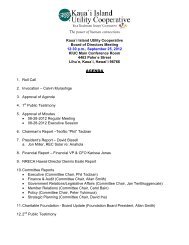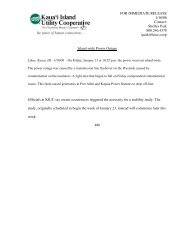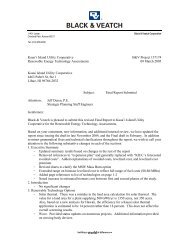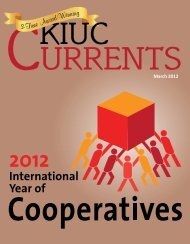KIUC's Rate Case - Kauai Island Utility Cooperative
KIUC's Rate Case - Kauai Island Utility Cooperative
KIUC's Rate Case - Kauai Island Utility Cooperative
You also want an ePaper? Increase the reach of your titles
YUMPU automatically turns print PDFs into web optimized ePapers that Google loves.
KIUC CEO Randy Hee answers a question during the June 3 public<br />
meeting about KIUC’s recent application for a rate increase.<br />
Facing monthly losses for the first time since becoming a<br />
customer-owned cooperative, Kaua‘i <strong>Island</strong> <strong>Utility</strong><br />
<strong>Cooperative</strong> (KIUC) is seeking a new rate schedule that<br />
will increase revenues by 10.5 percent—about $16 a<br />
month for an average residential consumer.<br />
The new rate proposal is scheduled to be presented to the<br />
state Public <strong>Utility</strong> Commission around July 1.<br />
KIUC Chief Financial Officer David Bissell said the<br />
utility’s revenues are slightly below costs for the first five<br />
months of the year.<br />
The rate proposal calls for slightly reduced pass-through<br />
costs when oil prices rise, but higher base rates, so bills<br />
will be somewhat higher for the same amount of power.<br />
The utility’s current rates were established 13 years ago.<br />
While costs have risen, the company has been able to<br />
delay increasing rates by balancing increased expenses<br />
with significant increases in efficiency of its power plants<br />
12 KIUC CURRENTS<br />
KIUC’S RATE CASE<br />
and an increasing customer base. This year, however, the<br />
continued increase in costs plus a declining economy<br />
caught up with KIUC.<br />
The island’s last electric rate case was completed in 1996,<br />
when crude oil prices were around $20 a barrel,<br />
compared with nearly $70 in early June 2009.<br />
Because most fuel costs are passed directly through to the<br />
consumer, those don’t damage the co-op’s bottom line. But<br />
some fuel costs based on the 1996 oil price are included<br />
in base rates. Other costs also are hurting the co-op.<br />
During the past 13 years, virtually all the utility’s<br />
expenses have risen: salaries, lubricating oil, copper wire,<br />
utility poles and the trucks repair crews drive. The<br />
Consumer Price Index—the national standard for the<br />
changing cost of goods and services—has gone up from an<br />
annual average of 156.9 in 1996 to 215 for 2008. That is<br />
a 37-percent rise during a period when base electric rates<br />
on Kaua’i have stayed flat.<br />
KIUC President Randy Hee said improved operating<br />
efficiency has helped keep the company balance sheets<br />
positive. But electricity users have trimmed their power<br />
consumption to the lowest amount in the island’s recent<br />
history. In May, average monthly residential use dropped<br />
from a long-term average of 520 kilowatt-hours (kWh) to<br />
430 kWh.<br />
That may be a conservation response to last year’s spike<br />
in fuel costs, or the current recession. It also might be a<br />
new energy-efficiency effort by the public. It has been<br />
suggested a cut in tourism means lower power use in<br />
rental home and condominium units. While it is unclear<br />
which factor plays the biggest role, power consumption is<br />
way down. That means KIUC is selling less power, and<br />
bringing in less revenue.<br />
The company launched a cost-cutting drive, reducing its<br />
operating costs by $1 million and its capital costs by $6<br />
million for 2009, Bissell said, noting that has not been<br />
enough to keep the balance sheet in the black.<br />
KIUC’s sales in 2008 were down 3 percent from 2007. In<br />
the first quarter of 2009, they were down 8 percent from<br />
the same period in 2008. In May 2009, energy sales were<br />
down 14 percent from May 2008. The decline is<br />
unprecedented in Kaua’i electric utility history.<br />
The utility’s margins are reduced $2.5 million with every<br />
5 percent drop in energy sales.<br />
“If sales stay down, our financials will continue to be<br />
under stress,” Bissell said.<br />
KIUC officials have recognized for some time that they<br />
would need more revenue, and that the cooperative<br />
should overhaul the way rates are calculated.
















